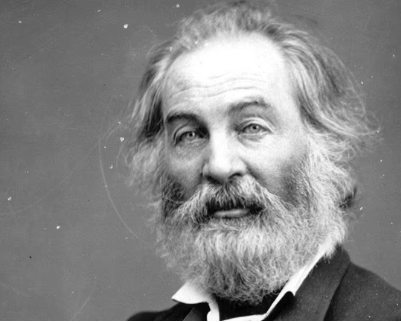The Origins of the Civil War: Thoughts by Walt Whitman, 1875.
Such, I say, form’d the entire personnel, the atmosphere, nutriment and chyle, of our municipal, State and National Politics—substantially permeating, handling, deciding and wielding everything—

Determining what caused the Civil War, so called, has proven to be fraught with bickering and recriminations. Why not add one more take on the subject?
In all of the material I have read, Whitman, in this excerpt, addresses the subject in a way that I've not seen before. Whatever one may believe about the causes of the War, Whitman seems to describe a view of the political processes producing government in terms that ring true.
Whitman's thoughts are a poignant contribution to the era's history.
August Glen-James, editor
Of the war of Attempted Secession—the greatest National event of the first Century of the United States, and one among the great events of all Centuries—the main points of its origin, and the conditions out of which it arose, are full of lessons, full of warnings yet to theRepublic, and always will be. The underlying and principal of those points are yet singularly ignored. The Northern States were really just as responsible for that War, (in its precedents, foundations, instigations) as the South. Let me try to give my view.
Of course many and very contradictory things, specialties, prejudices, Constitutional views, &c., went to make up the origins of the War—but perhaps the most significant general fact can be best indicated and stated as follows: For twenty-five years previous to the outbreak, the controlling ‘Democratic’ nominating conventions—starting from their primaries in wards or districts, and so expanding to counties, powerful cities, States, and to the great President-Naming Conventions—were getting to represent, and to be composed of, more and more putrid and dangerous materials. Let me give a schedule, or list, of one of these representative Conventions for a long time before, and inclusive of, that which nominated Buchanan. (Remember they had come to be the fountains and tissues of the American body politic, forming, as it were, the whole blood, legislation, office-holding, &c.)
One of these Conventions from 1840 to ’60 exhibited a spectacle such as could never be seen except in our own age and in These States. The members who composed it were, seven-eighths of them, office holders, office-seekers, pimps, malignants, conspirators, murderers, fancy-men, custom-house clerks, contractors, kept-editors, spaniels well-train’d to carry and fetch, jobbers, infidels, disunionists, terrorists, mail-riflers, slave-catchers, pushers of slavery, creatures of the President, creatures of would-be Presidents, spies, blowers, electioneerers, bawlers, bribers, compromisers, lobbyers, sponges, ruined sports, expell’d gamblers, policy-backers, monte-dealers, duelists, carriers of conceal’d weapons, deaf men, pimpled men, scarr’d inside with vile diseases, gaudy outside with gold chains made from the people’s money and harlot’s money twisted together; crawling, serpentine men, the lousy combings and born freedom-sellers of the earth.
And whence came they? From back-yards and bar-rooms; from out of the custom-houses, marshals’ offices, post-offices, and gambling halls; from the President’s house, the jail, the station-house; from unnamed by-places where devilish disunion was hatched at midnight; from political hearses, and from the coffins inside, and from the shrouds inside of the coffins; from the tumors and abscesses of the land; from the skeletons and skulls in the vaults of the federal almshouses; and from the running sores of the great cities. . . .
Such, I say, form’d the entire personnel, the atmosphere, nutriment and chyle, of our municipal, State and National Politics—substantially permeating, handling, deciding and wielding everything—legislation, nominations, elections, ‘public sentiment’ &c.,—while the great masses of the people, farmers, mechanics and traders, were helpless in their grip. These conditions were mostly prevalent in the North and West, and especially in New York and Philadelphia cities; and the Southern leaders, (bad enough, but of a far higher order), struck hands and affiliated with, and used them. . . . Is it strange that a thunder-storm follow’d such a morbid and stifling strata?
Source: Whitman, Walt. Memoranda During the War: Civil War Journals, 1863-1865.
